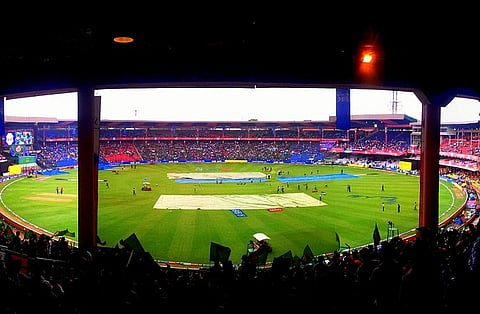

Amid a severe water crisis in Bengaluru, the National Green Tribunal (NGT) has sought details of water being used at the M Chinnaswamy Stadium during the Indian Premier League matches by May 2. The development comes after media reports said the stadium will be getting treated water for the IPL matches from the Cubbon Park Wastewater Treatment Plant.
The NGT has sought response from Karnataka State Pollution Control Board, Bangalore Water Supply and Sewerage Board (BWSSB) and Karnataka State Cricket Association (KSCA). Justice Prakash Shrivastava, who chairs the NGT bench, on April 1 ordered BWSSB to submit a detailed report with information on the quantity and source of water being used in Chinnaswamy stadium. The bench also sought details about the quality of treated water that is being supplied.
According to the report, the KSCA requested BWSSB to provide 75,000 liters of treated water per match. BWSSB agreed to the proposal and said that this could potentially prevent the misuse of groundwater and Cauvery river water while encouraging the usage of treated water.
Speaking to The Hindu, BWSSB Chairman Ram Prasath Manohar said that they have responded to the notice explaining the source of water being used and how much was being supplied to the KSCA.
Three IPL matches have been played in Bengaluru so far– on March 25 and 29, and April 2. KSCA CEO Shubendu Ghosh told PTI that the stadium has been complying with the NGT norms. “We are studying the notice and are confident of going ahead with the scheduled matches," he added.
On March 18, Karnataka Chief Minister Siddaramaiah had admitted that Bengaluru was facing a shortage of 500 million liters per day (MLD) of water daily and that the state government was taking measures to tackle the crisis. He also said that out of 14,000 government bore wells, 6.900 were dry. In the wake of the water crisis, several measures were taken up by the BWSSB, including making it compulsory for people to obtain permission for digging up borewells. In March, the authorities had also banned the usage of Cauvery water for washing cars, gardening, construction, water fountains and road construction and maintenance in Bengaluru for three months. The order said that violators will be fined Rs 5000, and repeated violations will incur Rs 5000 with an extra Rs 500 penalty per day.
Read: Bengaluru faces shortage of 500 MLD water daily, says CM Siddaramaiah